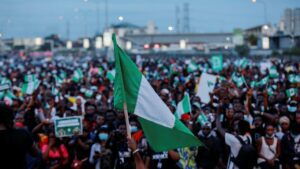
Presidential election: Why Nigerians must react within the ambit of law to Tribunal Judgement
The awaited judgement of the Presidential Election Petition Court (PEPC) have in the last few days raised dust of concerns. The anxiety built around the subject became more tensed when the date announced for the delivery of judgement coincided with the nationwide strike convened by the Nigeria Labour Congress (NLC), a development that was linked with political insinuations.
Security agencies in attempt to rest situation from disorder, convened meetings with the leadership of the labour forces in efforts to avoid a break down of order. Although, the NLC stated clearly the petrol subsidy removal policy of President Bola Tinubu as its reasons for embarking on the nationwide strike which on Tuesday recorded disruptions to economic and government activities, the Department of State Services (DSS) had earlier on Monday expressed political insinuations to planned protests, saying it uncovered moves by some politicians mobilising student leaders, ethic groups and associations, among others, for a violent protest.
The DSS made the revelation in a statement by its spokesperson, Peter Afunanya, adding that the objective of the protest was to rubbish the Federal Government and security agencies over “socio-economic matters.” DSS had said those plotting the protests had been identified and were being monitored.
The DSS, had said it has uncovered “plans by some elements in parts of the country to stage violent protests in order to discredit the Federal Government and security agencies over sundry socio-economic matters. Intelligence reports have indicated that the plotters include certain politicians who are desperately mobilising unsuspecting student leaders, ethnic-based associations, youth, and disgruntled groups for the planned action.
“Meanwhile, the Service has identified the ring leaders of the plot as well as sustained monitoring around them in order to deter them from plunging the country into anarchy. In view of this development, University Vice-Chancellors and Heads of Tertiary Institutions are advised to discourage their students from engaging in acts capable of derailing public peace.
“Also, parents and guardians are enjoined to admonish their children and wards respectively to shun the lure of participating in inimical behaviours or conduct against law and order.
“While the DSS is aware of the government’s efforts and determination to resolve some of the challenges confronting the nation, it warns those desirous of subverting national security to retrace their steps. This is more so that it will not hesitate to legally come against persons and groups behind the devious plans.”
The position of the DSS was one sending red signals of panic. However, despite its warning, strike actions by Labour Unions went on Tuesday day-1, while it continued for Wednesday day-2 coinciding with the delivery of the judgement of the tribunal court. Although, the strike on Tuesday farestalled two judgements that ought to have been delivered by the National/State Assembly Election Tribunal in Edo, a development that further created suspense, the PEPC went on with its judgement.
It is quite appreciable that the convening of protests amd strike in peaceful atmosphere is much desirable than those instigating and staging chaos and destructive outcomes.
The right of every group to express their grievances over matters of concerns remains part of the globally recognised inalienabe rights of citizens of every nation subscribing to democracy.
The National Association of the Nigerian Students (NANS) taking clue from the warning of the DSS had argued on this premise, declaring resolve to match for protest on the ground of the right of citizens to make their grievances known without being threatened. In a statement on Tuesday, the National Public Relations Officer of the Union, Giwa Temitope, reacting to the claim made by DSS that some politicians were mobilising student leaders for violent protest against the Federal Government over socioeconomic matters, had said the student body would be storming the Univeristy of Lagos (UNILAG) for the protest and urged the DSS not to infringe on the rights of students.
“It is quite embarrassing that the DSS has derailed to become the propaganda arm of the Federal Government, thereby, raising false alarms and even interfering in affairs that do not in any way relate to their line of profession. As an association, we maintain that we are not satisfied with how the Nigerian society is being run, most especially, as regards arbitrary fee increment across our tertiary institutions, with the University of Lagos being a model,” it said.
However, in as much as the security agencies have a duty to be proactive in their responsibilities to address appropriately every intending act that may portend threats to public peace and order, the citizens do also have the right to protest actions or inactions which speaks against their interests. Hence, it only translates that from any of the sides, acting within the purview of law would be the guiding lines of conduct. Therefore, while security operatives must be alive to their duties, particularly over tension that may rise from delivery of judgement on the presidential election, it is also rational for citizens to react to the development in the most sensible way as good citizens having obligations to live by law and order.
Hence, whichever way and whatever the outcome of the tribunal court may deliver, it behooves Nigerians to ensure their reactions do not dive outside the ambit of what is permissible by law. Acting within such limit is most reasonable and important giving thoughts to the aftermaths of the decisions. It appears some conducts and disposition over the awaited judgement of the tribunal court took many out of thought that the decision of the tribunal would not form the final lap, as those dissatisfied can still appeal unto the Supreme Court.
Speaking on this note, as tensions mount over the outcome of the verdict of the PEPC, Human rights lawyer, Femi Falana stated that the decision of the tribunal court is not final as parties could still appeal to the Supreme Court. Falana while speaking on Channels Television Politics Today programme, had said, “I am worried that people give the impression that everything ends with the judgement of the Court of Appeal, the Presidential Election Petition Tribunal. Any party that loses on Wednesday still has the opportunity to appeal to the Supreme Court.
“Once again, whoever is dissatisfied on Wednesday will have the opportunity to go to the court of appeal. It can be either way, election petition tribunals have delivered judgments in this country and sometimes those who you thought would win later lost, and for me, I want to appeal to Nigerians to allow the due process of law to take its course.”
He had submitted that “when the election tribunals are over, we have to go back to the drawing board, and perhaps turn our attention to other African countries. For instance, in the majority of African countries, election tribunals are concluded within 14 days, this is an area we have to review. Also, in order to fast track the decision of our Elections Petition Tribunal, we must embrace technology completely.”
It is thus important for Nigerians to look at the broader outlook in reactions to the various election pettions, particularly the presidential case, avoiding the temptation of the outcome generating divisionary reactions capable of further creating controversies for the nation, than dousing the prevailing tension which has left the country in clogs of socio-economic amd political shambles.


